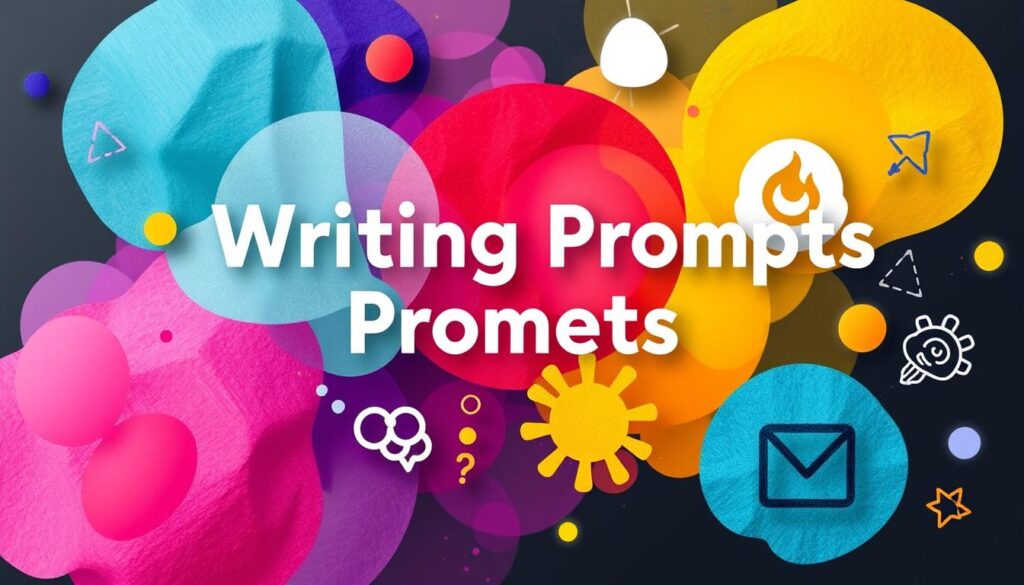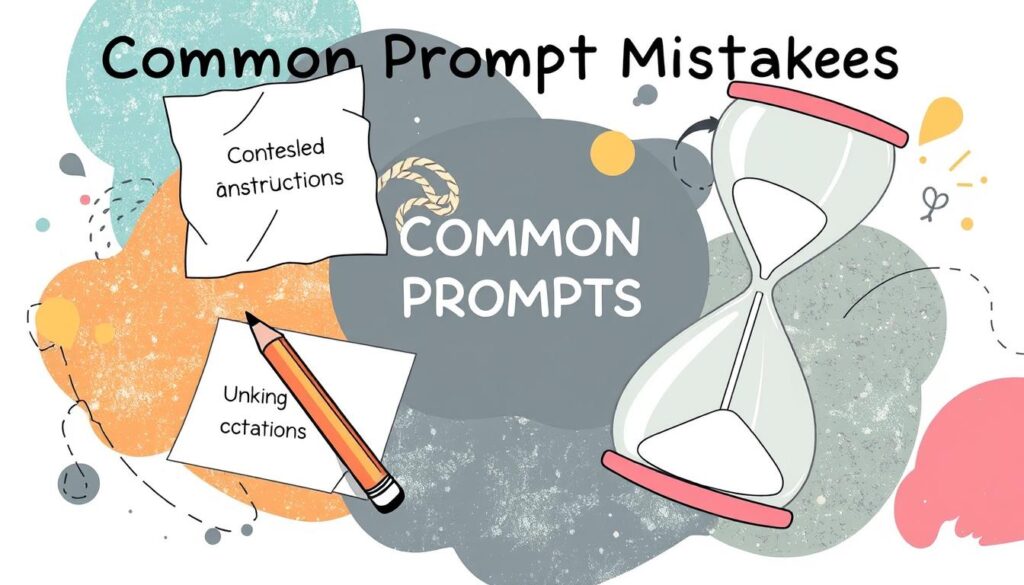“The scariest moment is always just before you start.” – Stephen King. This quote captures the essence of the fear that comes with starting a new writing project. It’s especially true when using tools like ChatGPT. A well-crafted prompt can steer the writing, boost creativity, and clarify thoughts. Understanding what makes a prompt effective is crucial for any writer.
ChatGPT, launched in November 2022, has quickly become a top choice for writers1. It offers a wide range of prompts, helping both new and experienced writers. Whether you’re just starting out or looking for new ideas, the right prompt can make a significant difference. This article will explore how to create effective prompts, showcase different styles, and demonstrate their impact on writing quality. With over seven prompts and numerous examples, there’s a wealth of resources to enhance your writing2.
Key Takeaways
- Prompts are essential for guiding and improving writing quality.
- ChatGPT’s diverse prompt options cater to various writing genres and styles.
- Specificity in prompts enhances clarity and response quality.
- Writers can utilize prompts to overcome creative blocks and enhance originality.
- AI tools like ChatGPT have revolutionized the approach to writing assistance.
Understanding the Role of Prompts in ChatGPT
In the realm of artificial intelligence, grasping ChatGPT prompts is key to enhancing output quality. The impact of prompts on AI responses is profound, serving as a guiding framework for the model’s results. With prompt engineering emerging as a promising field, there’s a growing need for experts in writing and machine learning to boost AI capabilities3.
How Prompts Influence Responses
Prompts are the cornerstone of communication with AI systems. Advances in natural language processing improve AI’s understanding of user inputs, leading to more meaningful interactions. Specific prompts yield more precise and relevant responses, significantly cutting down on errors4. Users find that detailed context leads to more tailored answers, unlocking ChatGPT’s full potential4.
The Importance of Specificity
Being precise with prompts enhances clarity in requests to ChatGPT. For instance, specific instructions lead to more efficient responses. By August 2023, users can set custom instructions, tailoring outputs to specific conversational needs3. This flexibility is crucial as industries use generative AI to create dynamic content, showcasing the benefits of well-defined prompts3.
Examples of Effective Prompts
Effective writing prompts include asking ChatGPT for summaries or social media content ideas. Advanced prompting strategies can enhance user interaction, like creating a library of successful prompts for individual or organizational needs4
The evolution of prompt engineering underscores the importance of refining communication with AI. Effective writing prompts maximize AI’s utility, reshaping content production across various sectors34.
Crafting the Ideal Writing Prompt
Creating effective writing prompts requires understanding key elements for success. Good prompt elements significantly improve ChatGPT’s response quality. Begin by giving clear instructions, which enhances communication and precision in AI output.
Key Elements of a Good Prompt
A solid prompt is built on clear, concise language. Emphasizing context narrows the AI’s focus, ensuring it meets your needs. Setting the tone and persona aligns the user’s intent with the AI’s response. Background text is crucial, making sure the AI’s output is relevant and tailored to your specific requirements5.
Directing the length of the response improves interaction. Asking ChatGPT clarifying questions refines the output, leading to greater satisfaction5.
Using Clear Instructions
Clear instructions guide the AI. Transparent communication of expectations leads to more relevant and accurate suggestions. The PromptPerfect tool optimizes prompts for clarity, detail, and structure, showing how effective prompts can elevate output quality5. The trend towards crafting effective prompts for AI applications underscores the need for structured guidance6.
Tailoring to Your Audience
Tailored ChatGPT prompts consider the audience. Crafting prompts for specific groups leads to more engaging and relatable suggestions, improving the writing process. Organizations should experiment and save successful prompts, recognizing their value in enhancing prompt-writing skills5. Community insights highlight the importance of expert guidance in fine-tuning prompts6.
Types of Writing Prompts for ChatGPT

Writing prompts are essential for boosting creativity. They act as a bridge between the user and ChatGPT, leading to various forms of writing. Knowing the different types of ChatGPT writing prompts helps writers reach their peak, creating content that meets specific needs.
Creative Writing Prompts
Creative prompts spark imagination and storytelling. They prompt writers to delve into new ideas, genres, and styles. By introducing vivid scenarios or unique character challenges, these prompts foster creativity. Writers can explore different themes and settings, unlocking their full creative potential.
Engaging with creative prompts opens up numerous avenues for expression. It allows for innovative stories and engaging writing.
Technical Writing Prompts
Technical prompts focus on clarity and precision in specialized texts. They help writers craft instructional materials or technical documentation. These prompts concentrate on specific tasks, leading to clear and effective communication.
When aiming for accuracy, it’s crucial to include detailed instructions in these prompts. This specificity allows ChatGPT to provide structured and detailed responses. Such content is invaluable to the target audience.
Academic Writing Prompts
Academic prompts support in-depth research and analytical writing. They guide essays, research papers, and critical reviews, encouraging thorough subject exploration. These prompts help writers develop strong arguments and support claims with solid evidence.
By specifying response length and tone, academic prompts ensure structured and coherent writing. Using creative, technical, and academic prompts helps writers manage their projects with clarity and focus.
Benefits of Using ChatGPT for Writing Improvement
ChatGPT brings significant advantages to the writing process, benefiting writers at every level. It offers instant feedback and suggestions, enhancing the quality of writing tasks by 18%, as shown in a study from MIT7. This tool is not just a proofreader but also aids in structuring sentences effectively. It makes it easier for writers to adjust their tone and style8.
Instant Feedback and Suggestions
ChatGPT’s ability to improve writing quality is evident. It provides feedback on grammar, style, and clarity, helping writers refine their work7. It serves as a proofreader and assists in structuring sentences, making it simpler for writers to adjust their tone and style8. Through real-time suggestions, it enhances the writing process and overall output.
Enhancing Creativity and Originality
ChatGPT aids in brainstorming ideas, leading to new concepts and unique angles in writing. It helps explore alternative endings and suggests impactful word choices. This sparks original thoughts that might not have been considered otherwise8. It also offers tailored prompts for various scenarios, ensuring writing is concise and engaging9.
Reducing Writer’s Block
ChatGPT is a powerful ally against writer’s block, providing suggestions to break the cycle of stagnation7. It acts as a collaborative tool, helping users streamline their work processes. It encourages the removal of fillers and focusing on essential messages, significantly reducing writer’s block9. Additionally, it simplifies complex topics and clarifies difficult concepts, saving writers time in research. This empowers them to stay focused and productive.
Best Practices for Engaging ChatGPT

Engaging with ChatGPT demands a strategic approach to unlock its full potential. Users can employ various strategies to enhance interaction and achieve superior outcomes. The key lies in experimenting with different prompt structures to elicit the desired responses.
Experimenting with Different Approaches
Users should delve into a range of prompt styles and structures. Studies show that prompts with specific constraints, like word limits, can boost relevant responses by 35% compared to general prompts10. Different writing styles, such as academic essays or blog posts, yield distinct results when specified11. This adaptability enables users to align interactions with their specific writing objectives.
Iterative Refinement of Prompts
Iteration is essential for refining ChatGPT outputs. Adjusting prompts based on previous responses can significantly improve the accuracy of the information received. A study found that breaking down complex questions into smaller, focused inquiries increased response accuracy by 25% in business-related topics10. Users can observe significant improvements in clarity by continually refining their prompts.
Incorporating User Feedback
User feedback is crucial during interactions with ChatGPT. It ensures that outputs meet individual needs and preferences. Clear and specific prompts have been shown to enhance engagement by 47% compared to ambiguous ones10. By integrating feedback and adjusting prompt structures, users can maximize ChatGPT’s capabilities as a writing assistant.
Analyzing ChatGPT’s Responses

Evaluating ChatGPT’s responses requires a detailed approach. It’s about assessing the quality and relevance of the suggestions given. This analysis is crucial for writers aiming to improve their content. By dissecting AI-generated content, users can evaluate AI output quality against their specific needs and goals.
Evaluating Quality and Relevance
Assessing ChatGPT’s output demands a thorough examination. Writers must determine if the responses meet their objectives and include the required information. Using different prompts can offer a variety of insights. For example, crafting 18 ChatGPT prompts for SEO can lead to targeted responses, like meta descriptions and content gap suggestions12. Exploring various writing styles also impacts the AI’s responsiveness and relevance13.
Identifying Areas for Further Improvement
Effective content creation relies on understanding what works and what doesn’t. Writers should document the strengths and weaknesses of AI suggestions. Identifying areas for improvement can lead to more substantial content. This can be done through iterative refinements, where adjusting prompts based on previous outputs can greatly improve subsequent results.
Learning from Mistakes
Every interaction with ChatGPT offers a chance to learn. When a response falls short, examining the prompt used can uncover unclear instructions or missing context. This ongoing cycle of improving writing through analysis enhances not just individual pieces but overall writing skills. It involves experimenting, analyzing outcomes, and refining for better results.
Utilizing ChatGPT for Different Writing Styles

Writers can significantly benefit from ChatGPT’s versatility in assisting with various writing styles. By mastering the art of adapting tone and voice, they can craft content that deeply resonates with their audience. This adaptability is key, as it can dramatically alter the message’s impact.
Adapting Tone and Voice
ChatGPT enables writers to fine-tune their tone and voice based on the context. For example, a persuasive tone is perfect for marketing, while a formal or authoritative voice suits academic papers. This flexibility is crucial, as it strengthens the connection with the audience, making the message both clear and captivating.
Addressing Various Genres
Different genres necessitate specific genre-specific writing prompts to effectively convey the intended message. ChatGPT offers over 60 distinct writing styles, from blog writing to technical documentation and creative storytelling14. This range allows writers to delve into various narrative forms, including descriptive or argumentative writing15.
Balancing Formal and Informal Styles
A well-crafted message often requires a blend of formal and informal writing styles. Writers can use prompts to create content fitting for formal reports or casual blog posts. ChatGPT aids in crafting responses tailored to achieve this balance, ensuring effective communication across contexts14. Embracing such adaptability boosts a writer’s skills, leading to a more proficient writing process.
Integrating ChatGPT into the Writing Process

Integrating ChatGPT into the writing process can significantly improve how one crafts written content. It aids in formulating ideas and structuring work more efficiently through effective pre-writing techniques. ChatGPT provides robust support at various stages, making it a valuable tool for enhancing writing skills.
Pre-Writing Strategies
Before starting a writing project, brainstorming ideas and outlining the structure is crucial. ChatGPT aids in these pre-writing techniques by generating lists, prompts, or outlines based on topics. It offers personalized responses, helping shape initial concepts. This allows writers to explore different angles before settling on a direction.
In-Writing Assistance
During the writing phase, ChatGPT’s assistance is invaluable. It provides real-time feedback, suggesting improvements in phrasing or style. This makes the writing process more interactive and productive, enhancing the flow and clarity of the text.
Post-Writing Edits
After drafting, ChatGPT is essential in the editing phase. It helps with proofreading and ensuring clarity in writing. By using ChatGPT, individuals save time and benefit from its ability to highlight inconsistencies and areas for improvement.
Common Mistakes with Prompts

Many users face hurdles when crafting prompts for ChatGPT. Recognizing common prompt mistakes can greatly improve the quality of responses. A major issue is being too vague and overloaded with prompts, which confuses the AI and yields irrelevant results. Studies show that a large number of one-line prompts are used for quick answers, often leading to generic responses that don’t meet the task’s needs16.
Being Too Vague
Creating vague prompts is a common error. Without clear goals, the AI cannot provide targeted responses, impacting the output’s quality17. It’s essential to provide clear instructions to avoid unsatisfactory or off-target results. By focusing on specificity, users can significantly enhance the effectiveness of ChatGPT’s assistance.
Overloading with Information
While context is crucial, overloading the AI with too much information can lead to unclear outputs. It’s important to break down complex requests into simpler parts to guide the AI. Feedback loops through iteration can refine prompts, leading to better responses16. Keeping information concise ensures tasks are executed effectively.
Ignoring the Context
Ignoring the context is another common mistake. AI models, including ChatGPT, heavily rely on context for relevant responses17. Each task should start a new chat to avoid confusion from previous interactions. Providing detailed background information can greatly influence the output, ensuring a better understanding of user intentions and desired outcomes18.
Success Stories: Writers Who Benefit from ChatGPT

Real-world examples show the profound impact of ChatGPT on various writing contexts. Each case study highlights how customized prompts lead to significant improvements. It proves that writers can achieve remarkable results across different genres and styles by leveraging AI.
Case Study: A Novelist’s Journey
A novelist used ChatGPT to enhance their story development. They received detailed feedback through specific prompts, leading to a score of 8 out of 10 for their writing sample. This feedback was crucial, showing a noticeable improvement in their work19.
By adopting a professional editor’s mindset, the novelist received valuable suggestions. These suggestions focused on plot structure and character development. This experience showcased ChatGPT’s effectiveness in refining narrative elements.
Case Study: A Student’s Research Paper
A student used ChatGPT to improve their research paper’s quality. They applied specific prompts, achieving a score of 7 out of 10. This score provided a clear evaluation of their writing quality19.
This experience showed how targeted prompts can enhance clarity and organization. It helped the student present a compelling argument, backed by thorough research.
Case Study: A Professional Blogger’s Growth
A professional blogger used ChatGPT to boost audience engagement. They implemented practical tips and utilized the Ghostwriting service. This allowed them to complete a business book for a client in just seven days20.
Through effective prompts tailored for each section, the content was organized logically. The blogger successfully incorporated original insights and personal stories. This maintained authenticity and served as a powerful example of AI’s role in efficient content development.
Future of AI in Writing Assistance

The future of AI in writing assistance is brimming with potential, set to revolutionize the writing world. Advances in AI writing models promise to significantly enhance the capabilities of tools like ChatGPT.
Potential Developments in AI Writing Models
Innovative AI suggestions are poised to transform the writing process, offering personalized assistance and boosting creativity21. Writers can look forward to better SEO-friendly titles, creative headlines, and tone analysis improvements. These enhancements will enrich the writing experience21. The rise of prompt engineering, with salaries from $175,000 to $335,000, is drawing professionals to this field22.
Ethical Considerations in AI-Generated Content
Ethical AI writing practices are essential as AI-generated content raises concerns about ownership rights and intellectual property22. As these technologies advance, the importance of responsible AI use grows. This is to address issues like misinformation and ensuring quality in creative writing21.
The Evolving Role of Writers
The role of writers is evolving, blending human creativity with AI tools. Writers are now tasked with creating profiles for various audiences, tailoring responses to their educational backgrounds and preferences22. This partnership enhances narrative quality and encourages deeper engagement with content. It shows that human insight remains invaluable, even with the advent of advanced AI writing models21.
Conclusion: Empowering Writers with ChatGPT
In the rapidly changing world of writing, adopting tools like ChatGPT can greatly empower writers. With 100 million weekly active users, ChatGPT proves its worth in tasks such as writing emails and creating business strategies23. This AI technology boosts creativity and productivity, turning writing into a collaborative, learning-focused experience.
Embracing Innovation in Writing
ChatGPT has brought a new era for writers seeking innovative strategies and skill refinement through prompt engineering. Users find that well-crafted prompts lead to more precise and relevant responses, enabling them to excel in various genres and industries24. This technology encourages writers to venture beyond their comfort zones, experiment, and explore new storytelling paths.
The Importance of Continuous Learning
To fully harness AI writing assistants, writers must commit to ongoing learning and prompt refinement. Through continuous experimentation, they can adapt and improve their techniques, creating content that deeply connects with their audience24. By embarking on this journey, writers can leverage platforms like ChatGPT as reliable allies, enhancing every writing project.
Encouragement to Experiment with Prompts
The integration of AI in writing goes beyond mere efficiency; it’s about sparking creativity and expanding possibilities. By encouraging writers to try different prompt types, from academic to creative, they can fully utilize ChatGPT’s capabilities. This approach positions them at the vanguard of a transformative writing experience, blending innovation with exploration23.
FAQ
What is the role of prompts in improving writing with ChatGPT?
Why is specificity important when crafting prompts?
What are some key elements of a good writing prompt?
Can you provide examples of different types of writing prompts?
What benefits can ChatGPT provide for writing improvement?
What are the best practices for effectively engaging with ChatGPT?
How should writers analyze the responses from ChatGPT?
In what ways can ChatGPT assist with different writing styles?
How can ChatGPT be integrated into various stages of the writing process?
What common mistakes should writers avoid when creating prompts?
Are there success stories of writers using ChatGPT?
What does the future look like for AI in writing assistance?
Source Links
- ChatGPT Prompts to Optimize Your Writing
- 7 ChatGPT Prompts To Improve Your Writing
- How To Write ChatGPT Prompts: Your 2024 Guide
- Effective Prompts for AI: The Essentials – MIT Sloan Teaching & Learning Technologies
- How to Craft the Perfect ChatGPT Prompt
- A Guide to Crafting Effective Prompts for Diverse Applications
- How to Use ChatGPT to Improve Writing – Boost Your Writing Skills
- How to Use ChatGPT to Improve Writing: Tips + Prompts – Delante
- ChatGPT Prompts that Make Your Writing More Concise
- Maven: Crafting Engaging Prompts for ChatGPT: Tips and Best Practices
- How to… use ChatGPT to boost your writing
- 234 ChatGPT Prompts (& How to Write Your Own)
- Master the Best Writing Styles for ChatGPT Prompts Today – AI-Pro.org
- 60+ Best Writing Styles For ChatGPT Prompts – Workflows
- 50+ Most Useful Writing Styles for ChatGPT Prompts
- 5 common mistakes you should avoid when prompting ChatGPT
- 6 Common AI Prompt Writing Pitfalls & How to Avoid Them – ChatAI
- 9 Mistakes To Avoid When Using ChatGPT
- Getting Writing Feedback with ChatGPT Using Specific Prompts: Simple Feature That Most People…
- How I wrote a book in one week with ChatGPT | Esther Jacobs
- The Future of Writing is here: Best AI Prompts For Copywriting
- 6 ways to write better ChatGPT prompts – and get the results you want faster
- 217 Little-Known ChatGPT Prompts You Can’t Afford to Miss Out On
- 100 ChatGPT Prompts for Any Scenario – Growth Tribe







